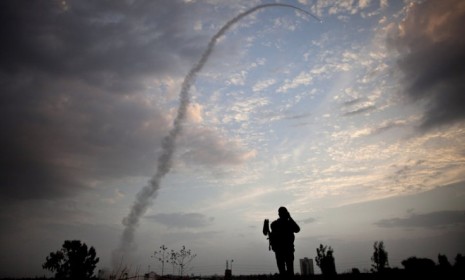How Hamas' long-range rockets changed Israel and the Middle East
Missiles that can reach once-safe Tel Aviv have made the war real in a whole new way for Israelis

A free daily email with the biggest news stories of the day – and the best features from TheWeek.com
You are now subscribed
Your newsletter sign-up was successful
Watching Israel and the Hamas-run Gaza Strip engage in a missile war, which could possibly lead to an Israeli ground invasion, has something of a bad-rerun quality to it (as this cartoon in The Week points out). But 2012's Operation Pillar of Defense, as Israel calls it, is different than 2008's Operation Cast Lead, the last time Israel invaded Gaza. One of the biggest changes: Hamas-aligned Qassam militants debuted new longer-range rockets on Sunday that can reach as far as the heavily populated metropolis of Tel Aviv.
"The significance of rockets fired on Tel Aviv and Jerusalem should not be underestimated," says Amir Oren in Israel's Haaretz. "Since 1948, no Arab country, except Iraq in 1991, has managed or dared to do what Hamas and the Palestinian Islamic Jihad have done" in targeting Israel's big cities. Until now, for all intents and purposes, "Tel Aviv, symbol of the Jewish state, has remained untouched." That's no longer true. And even though Israel's Iron Dome missile defense system has shot down the handful of rockets that made it to the cities, "what is important, psychologically, is that the imaginary barrier has been breached, and in a war of attrition, psychology is considered very important, especially in a population hovering between hope and despair."
Yes, "the Tel Aviv bubble has burst," says Mairav Zonszein at +972. Living in the city, it is terrifying to hear the incoming-missile sirens go off. You get a small sense of how demoralizing life must be in heavily targeted south Israel — maybe even a smidgen of the terror experienced right now by the Gazans.
The Week
Escape your echo chamber. Get the facts behind the news, plus analysis from multiple perspectives.

Sign up for The Week's Free Newsletters
From our morning news briefing to a weekly Good News Newsletter, get the best of The Week delivered directly to your inbox.
From our morning news briefing to a weekly Good News Newsletter, get the best of The Week delivered directly to your inbox.
Tel Aviv is geographically now a part of one of the local wars Israel periodically wages with one of its bordering neighbors. It is no longer immune. And as crappy as that is, maybe it's exactly what needs to happen — that Tel Aviv now needs to also be part of this cycle of violence, that the daily routines and the bars and the nightlife and the hi-techs cannot function normally. They tell you to continue with your daily routine, but who the hell really can? And who the hell really should? When your life is largely dependent on the whims of belligerent men in powerful positions, and the whims of their prized weapons — whoever you are, it's the same feeling.
But there's another big difference between this Arab-Israeli skirmish and the others that came before it: Iron Dome, says Sarah Tory at Slate. This is the first big test of Israel's high-tech missile defense system, and it's already being hailed in military circles as a "game-changer," shooting 80 to 90 percent of targeted Palestinian rockets out of the sky. "This level of success is unprecedented compared with older missile defense systems," and aside from keeping Israelis and their property safe, "the system buys Israel time, allowing it to plan out an appropriate response without the political pressure that would be generated by hundreds of potential deaths." It may be the main reason Israel hasn't invaded Gaza yet.
Iron Dome has turned an otherwise life-threatening experience into a sort of reality show, says Allison Kaplan Sommer at Haaretz. When the sirens blare, you see Tel Aviv residents glued to their TV sets, "hypnotized watching the spectacle of the Iron Dome" in action — "more fascinated than terrified, they looked like people watching a fireworks display." Still, the Tel Aviv bubble hasn't really burst so much as it's moved north, to the suburbs, where the missiles still can't reach. It's "bizarre and somewhat surreal weighing whether a routine venture into 'the city' for a business meeting or a scheduled shopping venture, or a yoga class is worth coping with sirens and 'booms.'" But as we can learn from Tel Avivians, bubbles are fragile. "At any minute, with one lucky lob of a long-range missile, ours could burst as well."
A free daily email with the biggest news stories of the day – and the best features from TheWeek.com